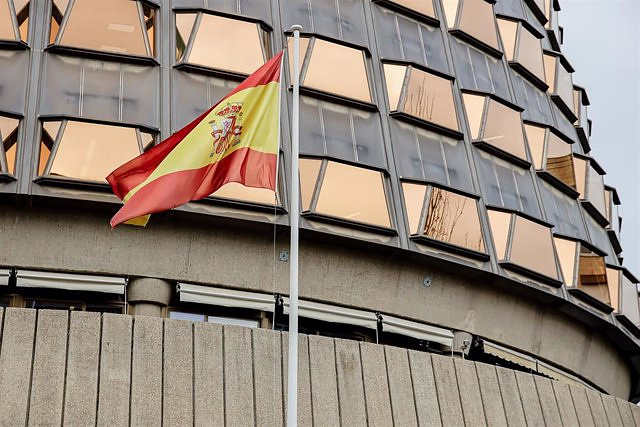Refuses to protect a Moroccan citizen delivered to his country of origin to be tried for drug trafficking
MADRID, 31 Ene. (EUROPA PRESS) -
The Constitutional Court (TC) has established doctrine on the necessary requirements for extraditions to be in accordance with the law and emphasizes that surrenders can be approved without authorization from a judge when it is contemplated in a bilateral agreement, as is the case of Morocco.
This has been expressed in a ruling in which it has unanimously agreed to dismiss the appeal for protection presented by a Moroccan citizen against the orders of the Criminal Chamber of the National Court (AN) - Second Section and Plenary - that authorized his delivery to Morocco to be tried for a crime of drug trafficking despite the fact that the request came from a prosecutor and not a judge.
In a press release, collected by Europa Press, the court of guarantees specifically reports on the ruling, for which President Cándido Conde-Pumpido was the speaker, rejecting the appeal that called for annulling the decisions of the AN because it was valid to an extradition request that was based on an international arrest warrant issued by the King's Prosecutor before the Tangier Court of First Instance that lacked judicial endorsement.
The plaintiff considered that the AN, by authorizing his surrender, violated his right to effective judicial protection for non-compliance with the canon of reinforced motivation, and his right to a process with all the guarantees in connection with the rights to personal freedom and freedom of residence. and circulation, in accordance with the jurisprudence of the TC itself.
Conde-Pumpido indicates in his ruling that the matter is of special constitutional significance in that it is ideal for undertaking a process of internal reflection aimed at clarifying and clarifying the doctrine regarding similar cases. And he advances that there are differential elements that prevent extending his decision-making criteria to the present case because in a previous ruling cited by the appellant --STC 147/2020-- the prison order was revoked in the country of origin, and in another --STC 147/2021-- it was an extradition without an agreement.
After this, the TC explains that it is appropriate to determine the needs to protect the right to freedom of the person to be extradited in light of the requirements of the European Convention on Human Rights, specifically determined in its article 5.1, the doctrine developed by the Court European Court of Human Rights (ECHR) in its interpretation, and in accordance with the primacy held by extradition agreements in the system of sources applicable to this modality of international judicial assistance.
In this way, Conde-Pumpido explains that it is advisable to clarify and clarify the jurisprudential doctrine and establishes that as a rule the judicial body must verify when examining the extradition request the impartiality of the authority that issued it, "a guarantee inherent to the duty of reinforced motivation of a decision that must necessarily affect the sphere of personal freedom of the person sought".
And he adds that there must also be a specific guarantee consisting of the request being endorsed by a judicial authority from the same country of origin, "which is directly applicable in the absence of an extradition agreement with the claiming State."
This doctrine, and therein lies the nuance, "can be modulated depending on the provisions of the extradition agreement in force between the parties, as a normative source of preferential application."
Thus, it indicates that "even though it is an inherent requirement of the effective judicial protection of the right to personal freedom of the extraditable that the courts verify that the necessity and proportionality of the measure has been duly weighed by a judicial body of the issuing country, said intermediation Judicial action may be waived exceptionally when certain requirements are met.
In this sense, it lists that this exemption is possible when it comes to an extradition procedure governed by a bilateral or multilateral agreement that admits the possibility that the request for surrender may emanate from a non-jurisdictional authority; that the requesting country provides information sufficiently expressive that it is a competent authority that, in accordance with its domestic legislation, is empowered to issue an extradition request under conditions equivalent to those of a judicial authority; and that the content of the request and the attached documentation provide the Spanish judicial bodies with sufficient information to verify that it is necessary and proportionate.
After this, he points out that the Moroccan citizen's challenging approach is rejected because article 12 of the bilateral extradition agreement signed with the Kingdom of Morocco "does not require the issuance of a judicial resolution as a starting point for the surrender request, so "The documentation sent in support of the extradition request is not outside the legal coverage established by the applicable sources."
On the other hand, it indicates that the complementary information sent by Morocco "is sufficiently expressive of the integration of the prosecution in the judicial body, its conditions of impartiality and the equivalent value that the country's legislation grants to international arrest warrants issued by the prosecutor with respect to those issued by an investigating judge within the scope of his jurisdiction, which excludes the need for judicial validation".
In this case, he adds, the documentation sent by the Moroccan authorities through diplomatic channels, which includes the international arrest warrant and the extradition request issued by the King's Prosecutor, "contains a detailed exposition of both the facts imputed to the applicant for protection as well as its legal qualification and the investigative procedures carried out under the direction of the Moroccan prosecutor's office".
In his opinion, the basis of the accusation "does not allow us to question the necessity and proportionality of his decision to request his surrender to ensure his prosecution."
And, in response to this, the ruling declares that the challenged judicial resolutions of the AN, by giving jurisdictional action to said request, have not violated the substantive and procedural fundamental rights invoked in the application for protection.

 Exploring Cardano: Inner Workings and Advantages of this Cryptocurrency
Exploring Cardano: Inner Workings and Advantages of this Cryptocurrency Seville.- Economy.- Innova.- STSA inaugurates its new painting and sealing hangar in San Pablo, for 18 million
Seville.- Economy.- Innova.- STSA inaugurates its new painting and sealing hangar in San Pablo, for 18 million Innova.- More than 300 volunteers join the Andalucía Compromiso Digital network in one month to facilitate access to ICT
Innova.- More than 300 volunteers join the Andalucía Compromiso Digital network in one month to facilitate access to ICT Innova.-AMP.- Ayesa acquires 51% of Sadiel, which will create new technological engineering products and expand markets
Innova.-AMP.- Ayesa acquires 51% of Sadiel, which will create new technological engineering products and expand markets Mañueco emphasizes that Spain does not want "a president in hiding" and "surrounded by justice"
Mañueco emphasizes that Spain does not want "a president in hiding" and "surrounded by justice" The 'number three' of the PSOE, Santos Cerdán, will appear this week in the Senate commission of the Koldo case
The 'number three' of the PSOE, Santos Cerdán, will appear this week in the Senate commission of the Koldo case The 'Freedom Flotilla' denounces Israel's "sabotage" of its mission and asks for support and dissemination
The 'Freedom Flotilla' denounces Israel's "sabotage" of its mission and asks for support and dissemination 12M.- Díaz: "I ask Mr. Feijóo to stop laminating the politics of our country"
12M.- Díaz: "I ask Mr. Feijóo to stop laminating the politics of our country" How Blockchain in being used to shape the future
How Blockchain in being used to shape the future Not just BTC and ETH: Here Are Some More Interesting Coins Worth Focusing on
Not just BTC and ETH: Here Are Some More Interesting Coins Worth Focusing on UPV students build a prototype of a wooden house to move to Equatorial Guinea
UPV students build a prototype of a wooden house to move to Equatorial Guinea The UA opens the call for the Impulso 2024 Awards for the best innovative business initiatives
The UA opens the call for the Impulso 2024 Awards for the best innovative business initiatives ALI, virtual assistant from Alicante, internationally recognized by the OECD
ALI, virtual assistant from Alicante, internationally recognized by the OECD Retrópolis brings the golden age of video games and computing to the UPV
Retrópolis brings the golden age of video games and computing to the UPV A million people demonstrate in France against Macron's pension reform
A million people demonstrate in France against Macron's pension reform Russia launches several missiles against "critical infrastructure" in the city of Zaporizhia
Russia launches several missiles against "critical infrastructure" in the city of Zaporizhia A "procession" remembers the dead of the Calabria shipwreck as bodies continue to wash up on the shore
A "procession" remembers the dead of the Calabria shipwreck as bodies continue to wash up on the shore Prison sentences handed down for three prominent Hong Kong pro-democracy activists
Prison sentences handed down for three prominent Hong Kong pro-democracy activists ETH continues to leave trading platforms, Ethereum balance on exchanges lowest in 3 years
ETH continues to leave trading platforms, Ethereum balance on exchanges lowest in 3 years Investors invest $450 million in Consensys, Ethereum incubator now valued at $7 billion
Investors invest $450 million in Consensys, Ethereum incubator now valued at $7 billion Alchemy Integrates Ethereum L2 Product Starknet to Enhance Web3 Scalability at a Price 100x Lower Than L1 Fees
Alchemy Integrates Ethereum L2 Product Starknet to Enhance Web3 Scalability at a Price 100x Lower Than L1 Fees Mining Report: Bitcoin's Electricity Consumption Declines by 25% in Q1 2022
Mining Report: Bitcoin's Electricity Consumption Declines by 25% in Q1 2022 Oil-to-Bitcoin Mining Firm Crusoe Energy Systems Raised $505 Million
Oil-to-Bitcoin Mining Firm Crusoe Energy Systems Raised $505 Million Microbt reveals the latest Bitcoin mining rigs -- Machines produce up to 126 TH/s with custom 5nm chip design
Microbt reveals the latest Bitcoin mining rigs -- Machines produce up to 126 TH/s with custom 5nm chip design Bitcoin's Mining Difficulty Hits a Lifetime High, With More Than 90% of BTC Supply Issued
Bitcoin's Mining Difficulty Hits a Lifetime High, With More Than 90% of BTC Supply Issued The Biggest Movers are Near, EOS, and RUNE during Friday's Selloff
The Biggest Movers are Near, EOS, and RUNE during Friday's Selloff Global Markets Spooked by a Hawkish Fed and Covid, Stocks and Crypto Gain After Musk Buys Twitter
Global Markets Spooked by a Hawkish Fed and Covid, Stocks and Crypto Gain After Musk Buys Twitter Bitso to offset carbon emissions from the Trading Platform's ERC20, ETH, and BTC Transactions
Bitso to offset carbon emissions from the Trading Platform's ERC20, ETH, and BTC Transactions Draftkings Announces 2022 College Hoops NFT Selection for March Madness
Draftkings Announces 2022 College Hoops NFT Selection for March Madness























